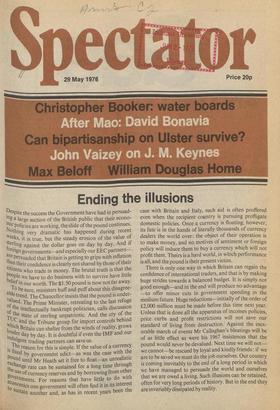Ending the illusions
Pespite the success the Government have had in persuading a large section of the British public that their econoZiiie Policies are working, the slide of the pound continues. "othing very dramatic has happened during recent weeks, it is true, but the steady erosion of the value of sfterling against the dollar goes on day by day. And if °reign governments—and-especially our EEC partnersaje Persuaded that Britain is getting to grips with inflation in, en their confidence is clearly not shared by those of their citizens who trade in money. The brutal truth is that the Fe°Ple we have to do business with to survive have little elief in our worth. The $1.50 pound is now not far away. jo be sure, ministers huff and puff about this disagreeyaule trend. The Chancellor insists that the pound is underofl,u,ed. The Prime Minister, retreating to the last refuge „„ "le intellectually bankrupt politician, calls discussion ulLthe state of sterling unpatriotic. And the cry of the w,u.0 and the Tribune group for import controls behind Britain can shelter from the winds of reality, grows r day by day. It is doubtful if even the IMF and our 1,11gent trading partners can save us. is he reason for this is simple. If the value of a currency xe,d by governmdnt edict—as was the case with the ex—krki until Mr Heath set it free to float—an unrealistic thecuange rate can be sustained for a long time through .6.u0verse of currency reserves and by borrowing from other nments. For reasons that have little to do with t-o-°11°Irlics one government will often find it in its interest sustain another and, as has in recent years been the case with Britain and Italy, such aid is often proffered even when the recipient country is pursuing profligate domestic policies. Once a currency is floating, however, its fate is in the hands of literally thousands of currency dealers the world over: the object of their operation is to make money, and no motives of sentiment or foreign policy will induce them to buy a currency which will not profit them. Theirs is a hard world, in which performance is all, and the pound is their present victim.
There is only one way in which Britain can regain the confidence of international traders, and that is by making huge strides towards a balanced budget. It is simply not good enough—and in the end will produce no advantage —to offer minor cuts in government spending in the medium future. Huge reductions—initially of the order of £2,000 million must be made before this time next year. Unless that is done all the apparatus of incomes policies, price curbs and profit restrictions will not save our standard of living from destruction. Against the inexorable march of events Mr Callaghan's bleatings will be of as little effect as were his 1967 insistences that the pound would never be devalued. Next time we will not— we cannot—be rescued by loyal and kindly friends: if we are to be saved we must do the job ourselves. Our country is coming inevitably to the end of a long period in which we have managed to persuade the world and ourselves that we are owed a living. Such illusions can be retained, often for very long periods of history. But in the end they are invariably dissipated by reality.










































